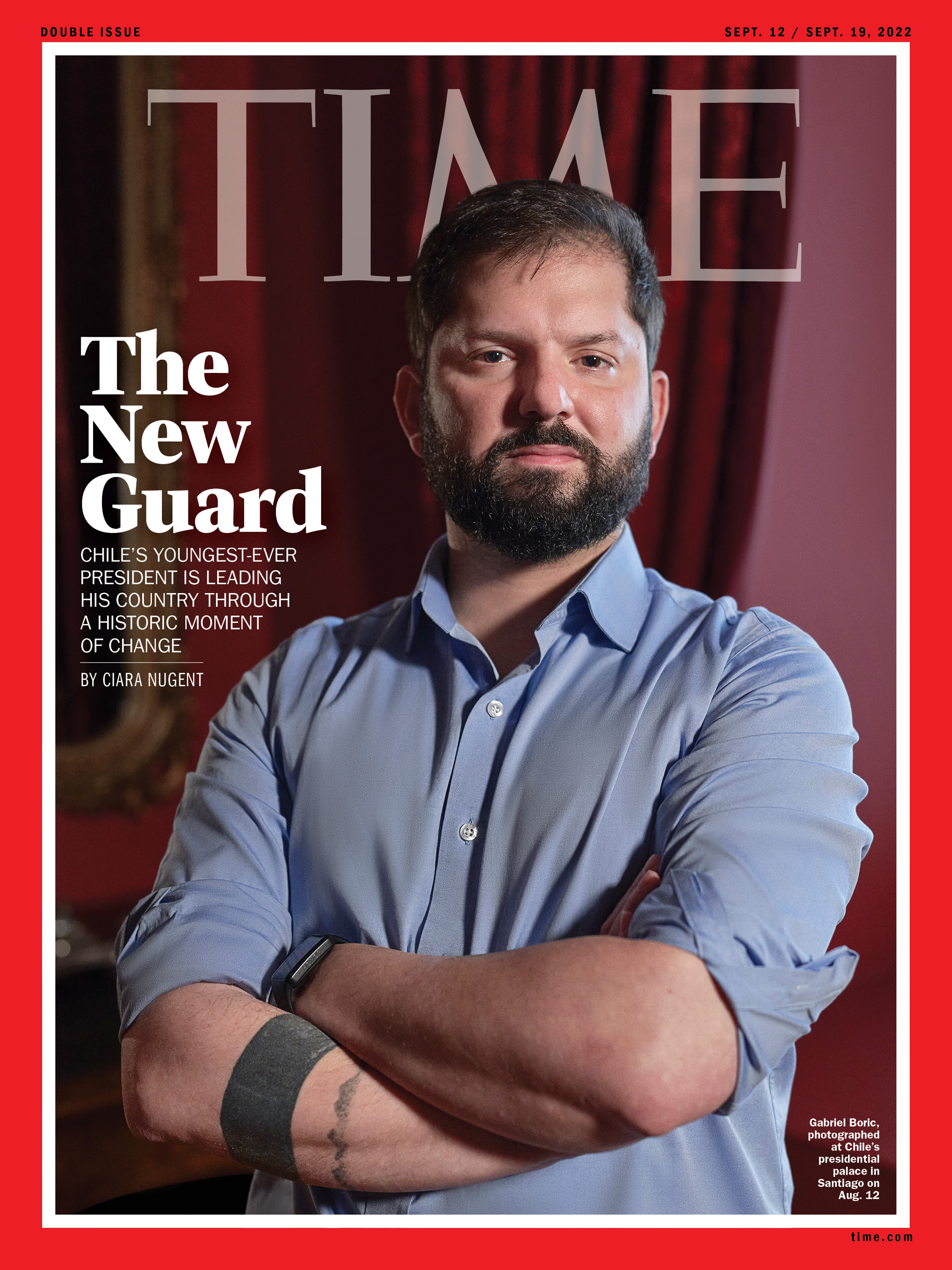Read this story in Spanish
Read the Cover Story: Chile’s Millennial President Is a New Kind of Leftist Leader
Gabriel Boric, Chile’s youngest ever president, is leading his country through a historic decision. Less than six months after Boric took office, Chileans are about to vote, at a Sept. 4 referendum, on whether or not to adopt a new constitution.
The old constitution, written in 1980 under rightwing dictator Augusto Pinochet, has helped to shape Chile into what it is today: a business-friendly, small-government country, richer than most of its neighbors in South America—but also a deeply unequal society, where working class people struggle to make ends meet.
The new constitution, drafted by a specially elected assembly, promises sweeping progressive reforms, such as a new national health service, greater autonomy for Indigenous people and tighter controls on the mining sector. Supporters say it will transform Chile into a fairer, more democratic, and stronger country. Opponents say it will destroy economic and political stability. Polls suggest a majority of voters plan to reject it.
Boric, the 36-year-old former student leader who was elected in December 2021 off the back of mass protests demanding social change, is urging Chile to approve the constitution. Whatever happens, as Chile’s most leftwing president in half a century, he is promising to transform the country.
TIME staff writer Ciara Nugent sat down with Boric in August to discuss the constitution, his political rise, and his vision for Chile. This transcript has been translated, condensed and edited for clarity.
TIME: You helped relaunch your student union at 14. What made you get into political activities at such a young age?
Gabriel Boric: I would say in 1998, in seventh grade, I realized that there was a problem in Chile. It was the year they arrested Pinochet in London. I remember having seen a protest by women who were relatives of disappeared detainees. I couldn’t understand it. Who makes someone disappear? Unless by magic. Where are they? And then I understood the depth of that question: where are they? It made me want to learn more. When I understood the history, I understood that the privileges that one has in a country like Chile are sustained by the fact that others don’t have them. It made me really angry. It made me want to change things.
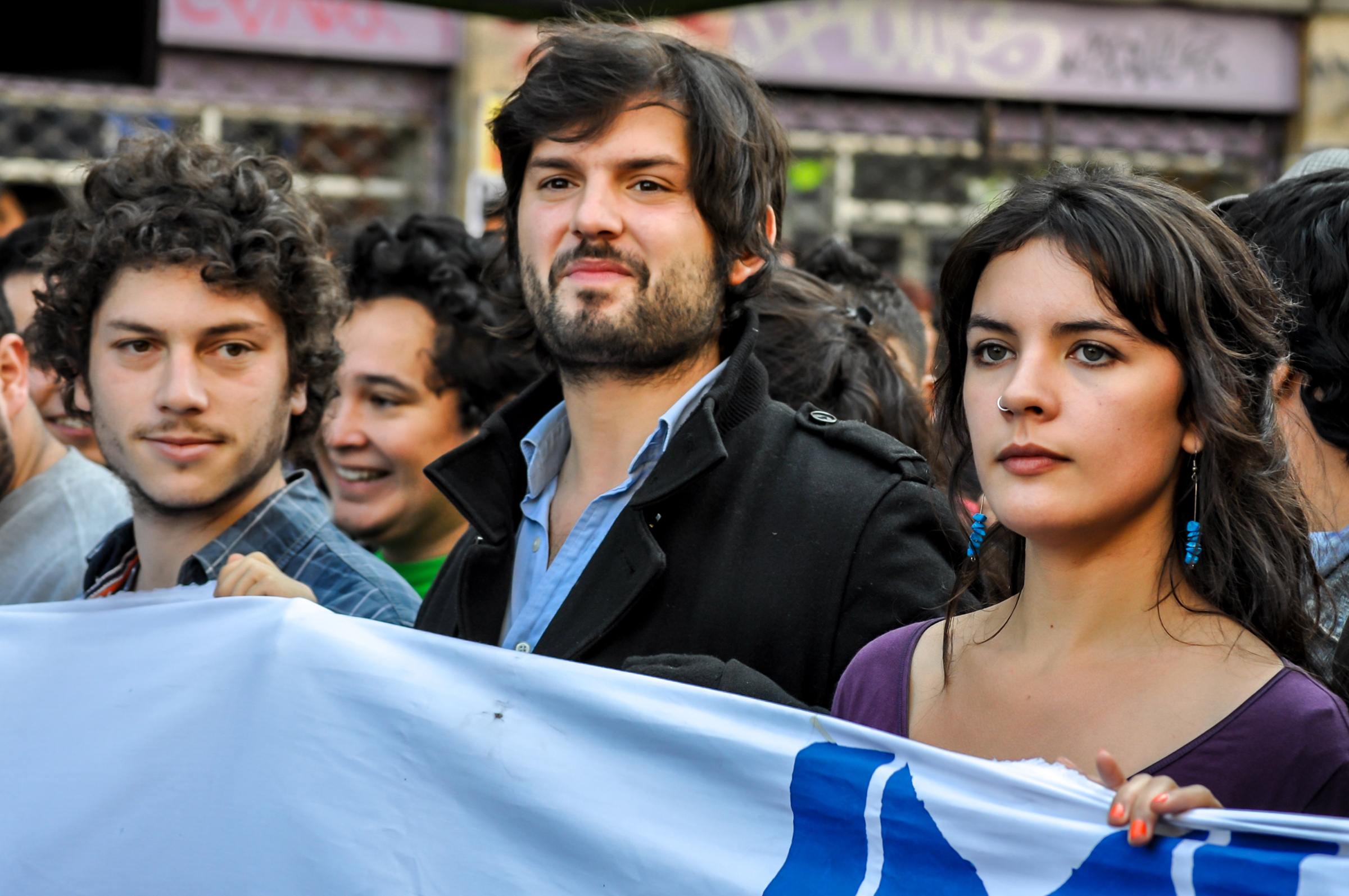
Two decades later, when you were a congressman, that kind of anger erupted nationally in the social explosion. How did you feel then?
We [leftist politicians] felt like we had a responsibility. We couldn’t just be agitators. We had to offer an alternative. Something that could channel the conflict in some direction. And that’s why together, with others, we bet on the process for the new constitution.
Chileans are about to vote on the new constitution that came out of that process, at a Sept. 4 referendum. What do you think of the text?
I think it’s positive. It’s an advance. It takes on issues that are really important not only for Chile but for the world. It has a vision of harmony between development and care for the environment, which was really alien to the constitutions of the 20th Century. It incorporates a feminist perspective, which is fundamental. And it establishes some tremendously important things, which we have to advance toward progressively: workers’ rights, the spreading of opportunities and resources outside of Santiago. I have a good opinion of the draft. There are always things that could be improved, and we’re having that debate. But it’s a big step forward for Chile.
Polls suggest a majority of Chileans plan to reject the document. If that happens, can you clarify what will happen?
Yes. Chile decided in October 2020 to have a new constitution. And the country decided that it had to be written by a body especially elected for that purpose. And that mandate still applies. If rechazo does end up winning, which would be legitimate, we have to continue with that mandate of the people.
Does that mean elections for a new constitutional convention?
That’s what we as a government want to do. Because we understand that there is a mandate from the people: this isn’t a whim. The people have decided on that point. We can study the details but that’s the main mandate.
A rejection would be pretty disastrous for your agenda, wouldn’t it?
We still have consensus on the need for a new constitution and the need to update the foundations of our society. I am convinced that we are going to get there, independent of the result of Sept. 4. Now, we as a government have the duty to govern, regardless of what happens. There are problems that go beyond the constitutional conversation. Rising living costs, inflation, security, rights of children, education, health reforms, tax reforms, we’re going to continue working on all that. If rechazo wins, we will take a bit longer, but we will get there.
One thing people say about your leadership is that you listen to others and consider opposing views.
I think one really important thing is to keep your distance from fanatics. And be able to always remind yourself of why you’re here, to put your own path under revision. You have to be permanently questioning yourself. For that purpose, it really helps to listen.
Doubting and questioning yourself so much, is it hard to sit down and make a decision?
No. A moment comes when you’ve listened enough and you say, let’s go. Doubting doesn’t mean being erratic or insecure, but being able to improve your own position by listening to those in front of you. You have to take the time to listen, and sometimes that means going a little more slowly. I always say: we’re going slowly because we’re going far.
You have made quite a few U-turns though, since taking office. On withdrawals from the pension fund, on security. How do you explain that?
I think that being in government, our responsibilities are very different to what they were in other moments. I am the president of all Chileans. So sometimes I have to do things I don’t like. I think in politics, changing your position isn’t a weakness, as long as it’s coherent with your principles. I’m more concerned about people who can never change their mind. In the end, the decisions you take can’t be about your personal pride, they have to be about what best serves the people you represent. I’m more concerned about the people who never change their minds.
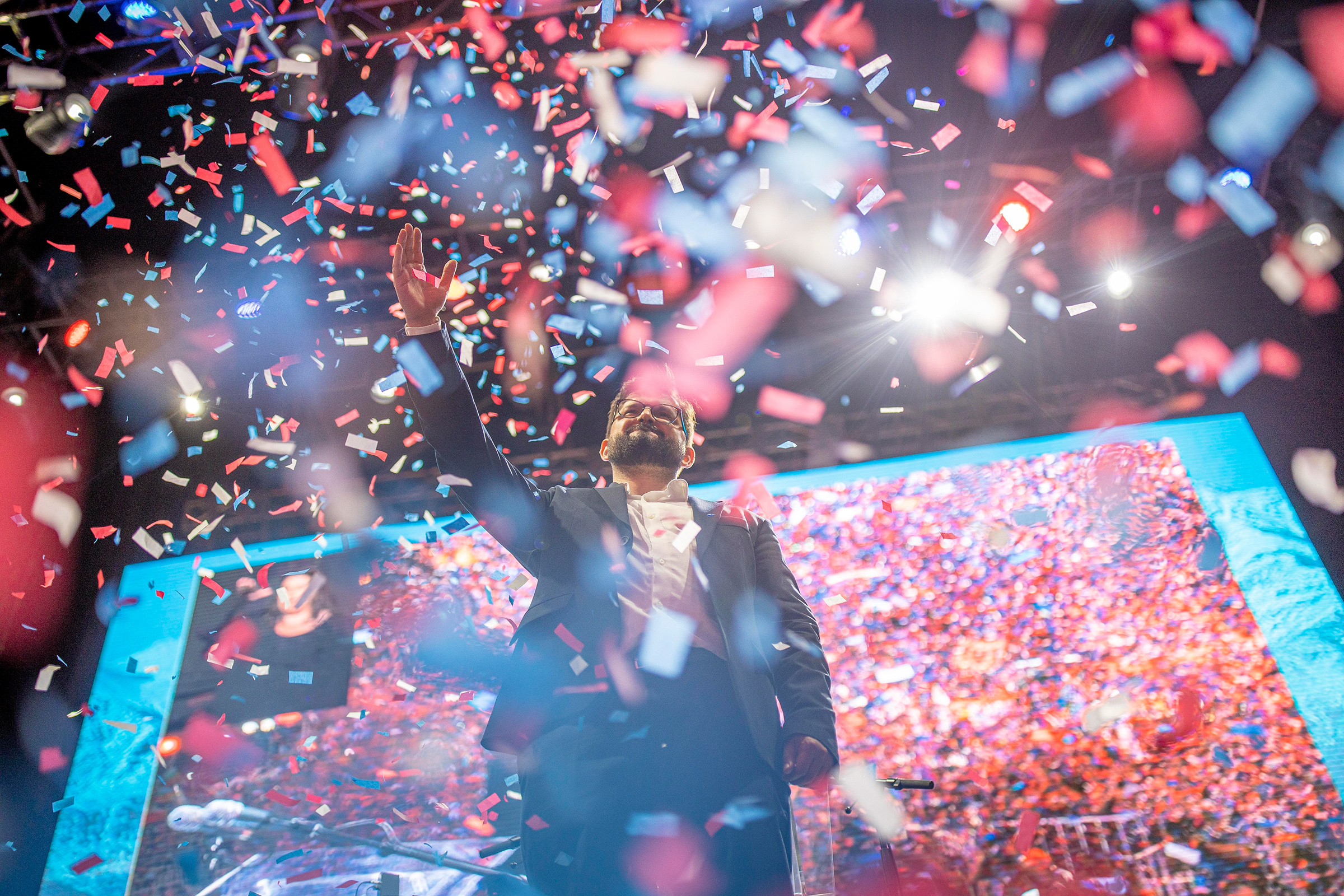
You changed your mind on Araucanía, the southern region where small groups of Mapuche separatists are in a violent conflict with the state. You imposed a state of emergency on the region’s roads after having opposed similar measures by your predecessor Sebastian Piñera. Some Mapuche campaigners say it seems like you don’t know what you’re doing.
I think in the beginning, yes, we were a bit headstrong about how to tackle it. But I’m still convinced that a state of emergency is not the solution. We had to implement it because our security challenges really were too big. But I’m convinced that the solution will come through a political dialogue between the Mapuche people and the Chilean state. Soon it will be the 200th anniversary of the Tapihue agreement in 1825, when the Mapuche people and the Chilean state established what their relationship would be. It’s time to negotiate again, and forge a new relationship that isn’t based on violence, exclusion, or poverty. And that’s where we have to concentrate our efforts. Unfortunately, there are some groups, which are not representative of the entire Mapuche people but who have arms, who have no interest in dialogue and use force to try to impose their point of view. They have to face the law like any Chilean.
Are you worried that militarizing an area where civilians live increases the risk of human rights abuses?
What we have done is protect and safeguard the roads. And the soldiers are not authorized to intervene in common public order situations. If there is a confrontation with weapons, there are certain protocols. We are going to be very strict in making sure there are no human rights abuses. We came to the government with that commitment. We can’t abandon it now.
You could argue that at this moment of instability in Chile, the country needs a leader who will take decisive, clear action and not go back on it.
I think we’re doing that. First of all, you have to realize that it’s a moment of uncertainty in the whole world. Look at Europe: there’s a brutal energy crisis, inflation, and war on European soil. I think we have to accept that we are living in very uncertain times. So what we need is political leaders who, in the face of that uncertainty, can work out the path forward together. We’re doing that. We’re not paralyzed.
What are you doing to move Chile forward?
We presented the tax reform. We’ve laid out what happens after the referendum: either improvements if the draft is approved on Sept. 4, or a new constitutional process if it’s rejected. We’ve deployed an economic package of more than $3.5 billion dollars to confront the effects of the crisis in a fiscally responsible way. There is a path.
Your most famous quote is probably: “if Chile was the cradle of neoliberalism, it will also be its grave.” I think some people in other countries might have heard “capitalism” in place of neoliberalism.
It’s not the same, no.
You weren’t announcing the end of capitalism, were you?
It would be very arrogant to announce the end of a productive system that has been active since the industrial revolution. The thing is that neoliberalism was an experience that was applied very strongly in Chile. They shrunk the state to its smallest size. They generated a radical individualism. I think that as a society we should aspire to forms of organization that go beyond capitalism. I’m not like I can say “capitalism ends today.” What I aspire to is that our government has the space to advance towards a social state of rights—what in the 20th century was known as social democracy, but incorporating new perspectives, like feminism, how to face the climate crisis, coexistence between different territories in Chile.
So, you don’t see yourself as a socialist?
I believe in a liberal socialist tradition, which was also critical of the course of the left in the 20th century, in the sense of believing that the state can solve everything. I believe deeply in private initiatives and organization. In the organization of civil society. I think they are complementary to the state. I don’t see a state controlling everything like in the socialisms of the 20th century, which failed. We have to take ownership of that failure.
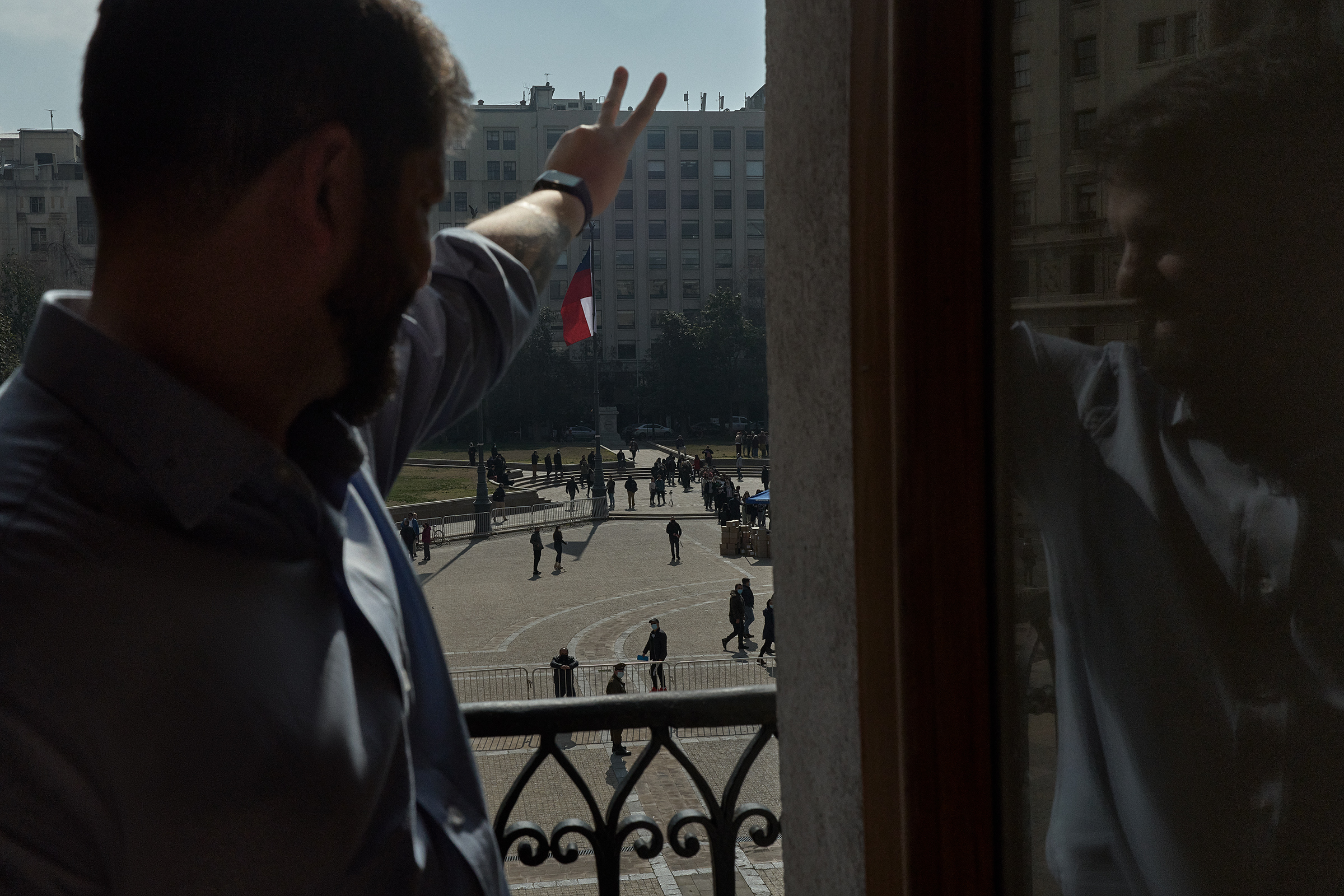
Older leftist leaders in Latin America have ended up bending the rules of democracy and institutions, or outright trampling them. Is democracy more important to you than leftism?
I don’t believe they’re contradictory. I’m a deeply democratic leftwing person. I think that the authoritarian drifts that leaders have allowed on the left have done a lot of damage not only to the idea of the left but also to their own people. That’s why I am a democrat first and foremost.
Will that manifest in your relations with the region?
I can’t get outraged when rights are violated in Palestine but not in Nicaragua. When the defense of human rights is partial, it loses legitimacy. I am very critical of the authoritarian drifts in the region’s left, and that has cost me a lot of criticism in my political sector. Sometimes in my sector there’s not much willingness to criticize your own. And I think that’s a mistake.
Does it frustrate you? That attitude of turning a blind eye to abuses on the left?
It is frustrating. But it gives me more motivation to show that you can do things differently. And in Chile we’re going to do it differently. I also have hope that with some of the new government—Petro’s for example, or potentially Lula’s if he returns—that we can advance in that direction.
You said during the Summit of the Americas that the region’s authoritarian governments—Cuba, Nicaragua, Venezuela—should still be invited to international meetings.
Exclusion hasn’t worked to correct things. Look at Cuba. It was excluded from the [Organization of American States] in the seventies. Has that had any impact? I would prefer to be able to tell Daniel Ortega that I don’t agree with him and he should release political prisoners—[like] Dora Maria Tellez—to say that to his face and confront him. If we have multilateral events and we only get those of us that agree together, it doesn’t make sense any more.
Do you think that if you have success in Chile, you could be a new model for making progressive change in a democratic way?
We have a lot of difficult challenges in Chile. And the main goal in governing has to be improving life for your people. You can’t worry about how history will unfold. If you do that you’ll get dizzy. It will be up to others to evaluate it after.
What do you think of the region’s other millennial leader, El Salvador’s Nayib Bukele. Is he an autocrat?
I don’t know him personally, and he hasn’t participated in multilateral summits. And if you choose freely not to participate, that is suspicious. Why not face the scrutiny of your peers? From what I have studied and my conversations with Salvadorans, there is indeed an authoritarian drift to confront a really serious problem: the gangs. I know it is a really difficult situation and has to be confronted very decisively, but that can’t be done by undermining democracy. The truth is I don’t identify with the way Bukele is leading his government. He probably feels the same about me.
At the moment there’s a lot of talk about what will happen in Brazil if Bolsonaro doesn’t accept the results of October’s election. What would you do to support democracy if that happened?
Well first it was really promising to see the Sao Paulo letter, which brings together a million signatures in favor of democracy, from a wide cross section [of society and politics.] I think that was a strong sign from Brazilian society. If there was an attempt, like there was in Bolivia for example in 2020, where accusations of fraud ended up being used to justify a coup d’etat, Latin America has to react together to prevent that happening.
You’ve talked a lot about the climate crisis. How do you plan to show leadership on that?
We are one of the few countries in Latin America that has committed by law to being carbon neutral by 2050. And we have the intention to bring that forward. We have the opportunity to develop and become a leader in renewable energy, in particular green hydrogen, and wind energy. And to export them to the world. To do so we’ll need investment and alliances with other countries.
But I also agree with Petro when he says that everyone has a responsibility, but some are more responsible than others. And more developed, bigger polluters need to fulfill their obligations under the Paris agreement. And we have to demand that they meet theirs. And I hope that as Latin American countries we will unify under one voice for that.
What can you do as a region to pressure others to act?
For example, make the export of raw materials or energy conditional on changes in consumption behavior in more developed countries.
Are you talking about lithium and copper?
Yes. And hydrogen.
Chile has massive reserves of those metals, but extracting them has caused a lot of harm to the local environment. Do mining companies have more to fear under your government than previous ones?
Not fear. We’re going to demand higher environmental standards. And for those standards to be met. But we’re going to respect the law. The important thing is to generate certainty. We spoke with [Australian mining company] BHP for example. BHP is making a $20 billion investment in Chile. And the important thing for them is to have certainty that we don’t change the rules half way through the game. We are going to be demanding on the environment but also stick to what the Chilean state commits to.
A lot of the foreign leaders you’re meeting these days have much more formal political cultures than the one you’re fostering here. Would you wear a tie for any of them?
No. I think you have to show respect for people’s positions, and their countries, but also for the country you represent. Everyone has their own style. And ways of dressing change over time. The prototype of masculinity in the 15th Century would today be considered feminine: French kings with high heels and stockings. And then you end up with Barack Obama sitting at the desk with his sleeves rolled up. I think I’m part of a transition. Ties just don’t make any sense to me.
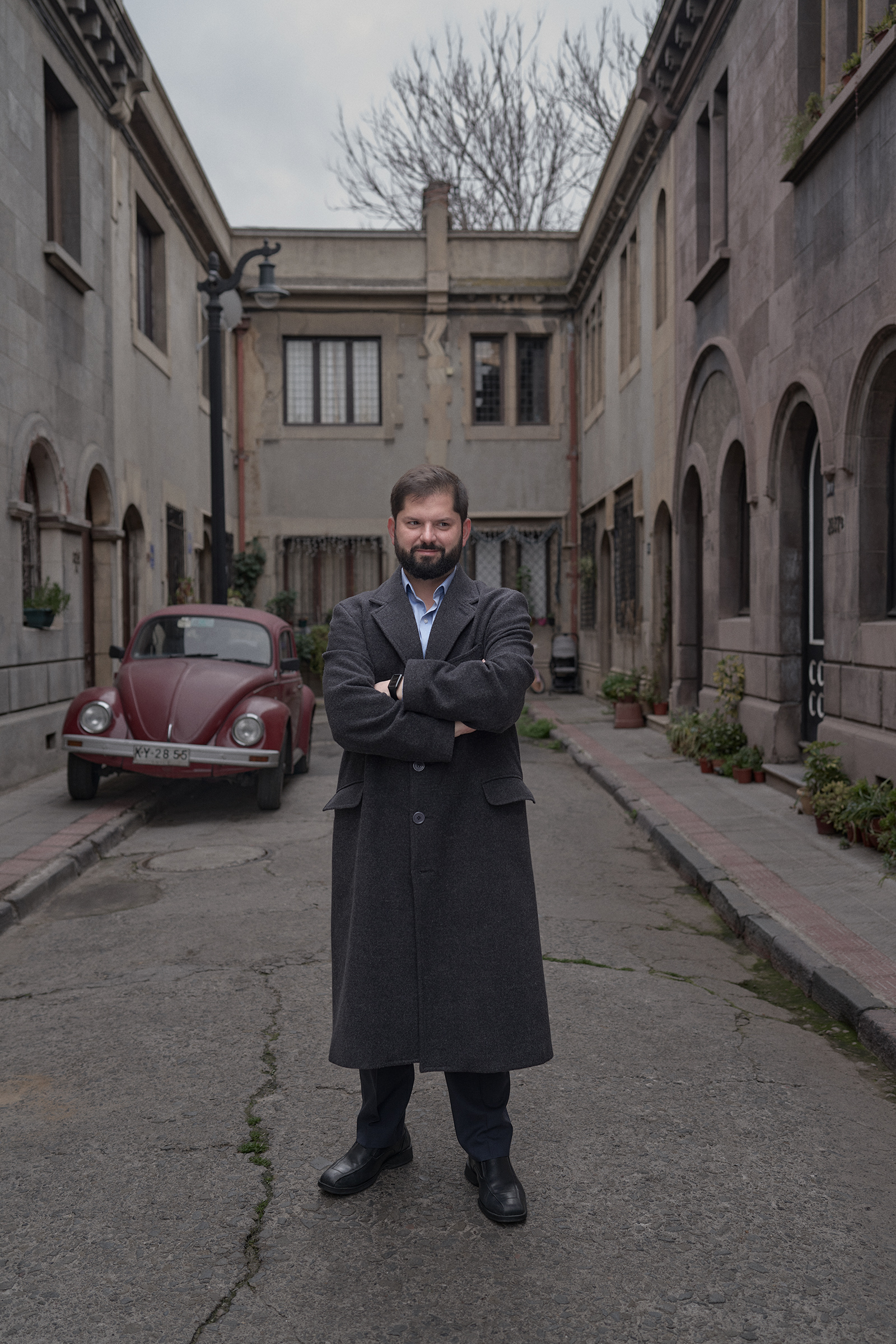
How do you feel when people in Chile criticize you for breaches of protocol? Like leaving your fly down…
Ah but that wasn’t a breach of protocol, it was a mistake! The pants didn’t fit right. It was a new suit and [the zipper] came down. And now I’m always worried when I’m getting out of the car.
I understand that today I occupy an office which is bigger than me. And so I have to be concerned about my presentation, because I represent the state of Chile. It’s okay for people to not like my clothes but I have to be orderly, clean, and worthy of the office. So I understand the criticism. And I’ve had a high level exposure for many years: I don’t [have] a mohawk anymore. It’s just part of the job.
You’ve spoken very openly about having OCD and about mental health problems. It highlights how strange it is that no other politicians talk about this. It’s very unlikely you’re the only one who has such struggles.
I think there’s a stigmatization of mental health where it’s associated with weakness. No one will criticize a president for being diabetic, but if a president has OCD it’s a problem. We have to break those myths. Fortunately the vast majority of mental illnesses can be treated these days. So we have to destigmatize them. I was interned in a psychiatric hospital because of OCD. And when I told people that, a lot of people wrote to me, relieved, to say, ‘Thank you, saying we had felt silenced.’
Now, this is a slightly job interview-style question: what are your biggest flaws?
There’s a lot of them—no doubt. I think in my life I’ve been very intense, but there are times I haven’t been very methodical. Routines can be hard for me. I’m not very well studied in math and science— though that’s why you have a team. I’ve made mistakes by being impulsive. So not taking decisions with a hot head is something you have to remember, because you can get angry a lot here.
What do you do to cope with the pressure of work?
I listen to music, almost constantly. Here [in La Moneda]. In my house I have a good record player, and a CD player too— I still buy CDs. I recently bought the complete 37 disc collection of Bob Dylan. I really like Blood on the Tracks from 1975. I also like Silvio Rodriguez, a Cuban. Charlie Garcia, an Argentine. Los Prisioneros in Chile. I like Punk. From more intentionally known acts, I like Tool a lot. Pearl Jam. Nirvana. Alice in Chains. I’ve listened to a lot of Metallica in my life. Radiohead.
What about Taylor Swift? You gained an international reputation as a Swiftie after tweeting support to her in January.
Ha, I’m actually not such a massive fan of Taylor Swift. What happened is that she has a really big group of fans in Chile and a lot of them started talking to me about her. They adopted me. I learnt her whole story, about her creative process; that she had to win back her albums because they defrauded her and she had to record them all again: “Taylor’s version.” I like Red. Folklore, “Cardigan.” It’s not the style of music I’m most into. But I have a lot of love for the Swifties.
More Must-Reads from TIME
- Cybersecurity Experts Are Sounding the Alarm on DOGE
- Meet the 2025 Women of the Year
- The Harsh Truth About Disability Inclusion
- Why Do More Young Adults Have Cancer?
- Colman Domingo Leads With Radical Love
- How to Get Better at Doing Things Alone
- Michelle Zauner Stares Down the Darkness
Write to Ciara Nugent/Santiago at ciara.nugent@time.com
